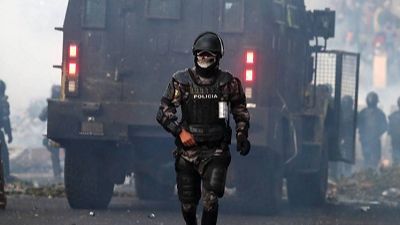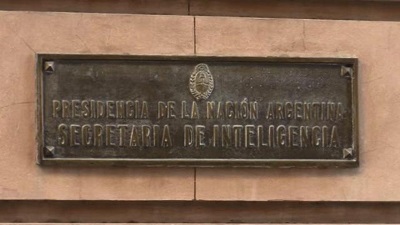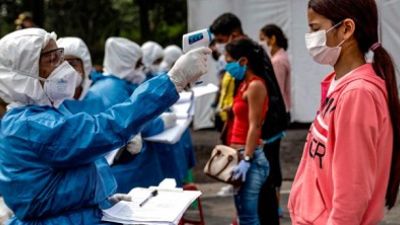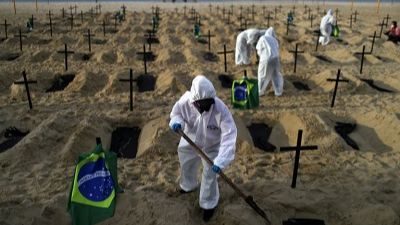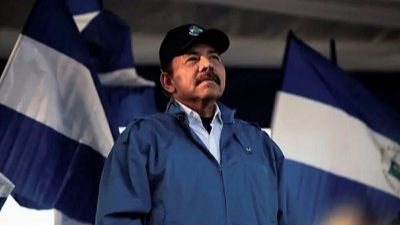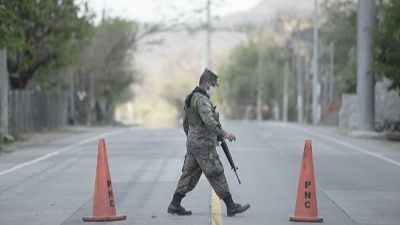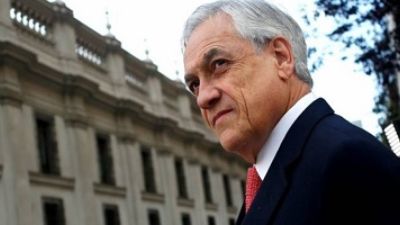
A tool designed by Directorio Legislativo to monitor
regulations with the potential to impact civic space
in Latin America and the Caribbean.
Fundación Directorio Legislativo | June 2020
About Civic Space Guardian (CSG)
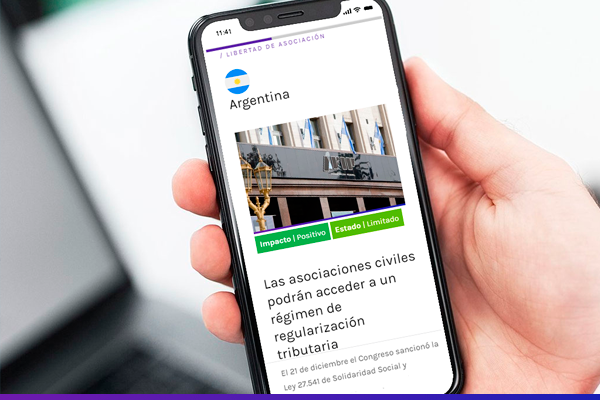
Civic Space Guardian (CSG) is a tool designed by Directorio Legislativo to monitor regulations with the potential to impact civic space in Latin America and the Caribbean.
These are regulations affecting freedom of expression, freedom of association, freedom of peaceful assembly, citizen participation and access to public information. To provide a broader overview, we also include the rating assigned by Civicus according to the state of civic space in each country.
The government regulated the progressive use of force in meetings and demonstrations

Ecuador
Impact | Negative
Rating CIVICUS | Obstructed
On May 29, the Ministry of Defence published a regulation that allows the progressive use of force by members of the Armed Forces in the face of meetings, demonstrations and disturbances that lead to “situations of serious internal commotion.” The protocol contemplates different levels of action in situations of “latent risk,” “psychological or passive resistance” and “defensive and aggressive resistance.” The Ombudsman’s Office and various social organizations warned that the regulation is not aimed at protecting the human rights of the protests, but rather to support the actions of the Armed Forces. In this regard, the control body reported that, if the Ministry of Defense does not overturn the regulation, it will file a claim of unconstitutionality before the Constitutional Court.o.
Congress looks into claims of illegal espionage of journalists, organizations and politicians

Argentina
Impact | Negative
Rating CIVICUS | Narrowed
On May 28, the Bicameral Committee for the Control of Intelligence Organizations and Activities met to analyze an illegal espionage complaint by the head of the Federal Intelligence Agency (AFI), Cristina Caamano. As detailed in the complaint, information on some 500 people linked to the political world, journalism, civil society organizations and the police was collected during the administration of former President Mauricio Macri. The surveillance tasks – discovered on a partially erased hard disk – had been ordered without judicial authorization by the authorities of the intelligence agency, which is currently intervened. On June 7, the judicial case began taking witness statements which are scheduled to continue throughout the month. On the other hand, the Senate rejected a decree from 2015 that transferred the handling of wiretapping carried out with a judicial order to the jurisdiction of the Supreme Court of Justice. Senators considered that the Court’s authority on wiretapping clashed with its oversight role regarding the AFI.
Scientists and medical personnel under threat for questioning official data on COVID-19

Venezuela
Impact | Negative
Rating CIVICUS | Repressed
On mid-May, the president of the National Constituent Assembly (ANC), Diosdado Cabello, publicly threatened scientists from the Academy of Physical Mathematical and Natural Sciences of Venezuela, whom he accused of stoking alarm in the population. The statements came in response to the publication of a report which used mathematical models to suggest that official figures could be underreporting infections at a rate of between 63% and 95%. Cabello warned the report was “an invitation for the state securities to call [the scientists].” The issue presents a fresh obstacle in Venezuela for freedom of investigation and disclosure of information. Previously, scientific institutions had been required by a joint resolution of the Ministries of Health and Science to register any investigations into COVID-19 with both institutions. The criminalization of medical personnel, organizations and journalists for disseminating technical information on the evolution of COVID-19 contrary to official data has been condemned by numerous resolución conjunta de los Ministerios de Salud y de Ciencia a registrar cualquier investigación sobre el COVID-19 ante ambas carteras. La criminalización del personal médico, las organizaciones y los periodistas por difundir información técnica sobre la evolución del COVID-19 que interpela los datos oficiales ha sido condenada por numerosas academic and civil society organizations and by the Inter-American Commission on Human Rights.
Rattled by the spread of COVID-19, the government sought to hide infection and death rates

Brazil
Impact | Negative
Rating CIVICUS | Obstructed
While the impact of the pandemic worsens in Brazil, the country with the second most infections worldwide, on June 5 the Ministry of Health decided to modify the methodology for disclosure of official data on the number of infections and deaths from COVID-19. After announcing that only daily statistics will be recorded in the reports, the government modified the figures that allow for a global assessment of the incidence of the disease. This is not the first change in the presentation of its data, but it is one that most compromised access to public information. On June 9, the government had to roll back the measure by order of the Federal Supreme Court following a legal challenge from three opposition parties. Before the decision was known, the president of Congress and the country’s main media groups had already pledged to start collecting the available statistics at the state level.
The President criminalizes critical voices and defends his policy in the face of COVID-19

Nicaragua
Impact | Negative
Rating CIVICUS | Repressed
In a response to national and internationally criticism over the government’s response to COVID-19, President Daniel Ortega published an official document, or white paper , in which he describes critical voices as “disinformative terrorism” and “false news campaigns.” He also refers to the role of the international media as “brutal, criminal and xenophobic.” The white paper released on May 25 details and justifies the measures taken, most of which were not published in the official gazette. The United Nations High Commissioner for Human Rights, Michelle Bachelet, has expressed concern in recent weeks regarding the increasing use of expressions that stigmatize and discredit the opposition and those who publicly criticize the government’s response to the crisis.
The Supreme Court declared the quarantine unconstitutional
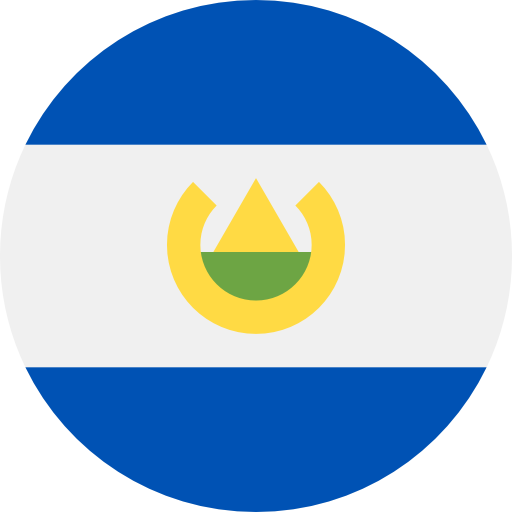
El Salvador
Impact | Negative
Rating CIVICUS | Obstructed
Since mid-May, El Salvador has been subject to a state of legal uncertainty that jeopardizes the protection of citizens’ rights and the control of the use of public funds to combat the COVID-19 pandemic. This situation stems from the presidential decision to extend the quarantine without the approval of the National Assembly. On June 8, the Supreme Court declared this decision – along with 10 previous executive decrees similarly curtailing movement and issued over the past 80 days – as unconstitutional. The ruling also applies the Temporary Restriction of Concrete Constitutional Rights Law, passed in March, given that at the time it was not adequately justified why the suspension of rights was a “suitable measure” to protect the population against COVID-19. The Court called on the Executive and Legislative branches to agree on a new law in the coming days and warned that measures issued in disregard of the resulting legal framework would have no legal effect. If authorities fail to comply, the quarantine will be lifted four days after the notification of the ruling.
Social organizations challenge proposed reforms to the national intelligence system

Chile
Impact | Negative
Probability | High
Rating CIVICUS | Narrowed
On June 8, a group of deputies, senators, party presidents, unions and civil society organizations sent a letter to the Chamber of Deputies challenging the government’s request for urgent discussion on the bill to reform the national intelligence system and the bill to protect infrastructure. In the letter, they argue that the initiatives violate human rights, installing an agenda of “militarization” of public security. The president of the National Defense Committee, Jorge Briteo, echoed their concerns, stating that an intelligence system is being proposed without an adequate control mechanism by part of the branches of the State. The initiatives would also allow the Armed Forces to be deployed in national territory without having to declare a State of Emergency. Given that the government urgently requested its processing, the House of Representatives should approve the reforms within 15 days.
New cyber patrol protocol could allow for mass surveillance of social networks

Argentina
Impact | Negative
Rating CIVICUS | Narrowed
Different social organizations expressed their concern about the possible implications of a protocol approved by the Ministry of Security on May 31, which enables security forces to perform cyber patrols on open sources and social networks. Authorities are seeking to detect crimes in relation to COVID-19, such as the marketing and distribution of counterfeit drugs. The observation and analysis of citizen information in the digital environment is, according to expert opinion, a criminal intelligence activity rather than crime prevention; therefore, it can only be performed under certain limits and with the proper authorizations. Using an intelligence tool to collect evidence of criminal activity en masse is an illegal practice that could hinder public debate, the circulation of ideas and the right to privacy. CSO representatives also emphasized that more information is needed on how the protocol will be applied and the technical means that will be used to enforce it.

Voices of civil society
CHILE
CHILE TRANSPARENTE
BRAZIL
Through a shortage of and delays in publicizing data that is essential for planning actions to combat COVID-19, Bolsonaro is putting the lives of thousands of Brazilians at risk. In doing so, he is breaching the basic principle of transparency, calling into question the quality and reliability of the data disclosed by the federal government, foregoing the role it could play in coordinating efforts to combat the pandemic, and putting Brazil’s credibility before the international community in jeopardy.
BRASIL TRANSPARENCIA INTERNACIONAL

Documents by Directorio Legislativo
Presidents’ advisors on COVID-19. Who is involved in determining the responses to the pandemic?
We strengthen democracies in Latin America
We are a non-partisan and independent organization that for 10 years has been promoting the constitution of autonomous, flexible, democratic and independent spaces, through dialogue with various actors in the public, private, academic and civil society sectors. The starting point of our work arises from the recognition and appreciation of the political and social plurality of Latin America.

Fundación Directorio Legislativo
Avenida Entre Ríos, 258 – 3E
Ciudad Autónoma de Buenos Aires, Argentina (C1079ABP)
Phone (+5411) 5218-4647

